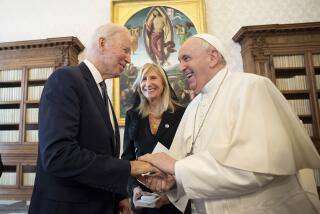Bishops Raise Moral Barriers to Force in Gulf
- Share via
U.S. Catholic bishops for the first time have raised moral objections to the possible use of military force by the United States in the Persian Gulf.
Los Angeles Archbishop Roger M. Mahony, acting as chairman of the bishops’ international policy committee, warned Secretary of State James A. Baker III in a letter Wednesday that a war “would jeopardize many lives, raise serious moral questions and undermine the international solidarity against Iraq.” The letter was released Thursday.
Mahony “strongly” urged the Bush Administration “to stay the course” with multinational economic sanctions against Iraq because of its Aug. 2 invasion of Kuwait.
The bishops, whose 54 million Catholics constitute the nation’s largest religious group, have joined a growing number of mainline Christian leaders opposing the use of military force to resolve the Persian Gulf crisis.
Jewish groups generally continue to support the Administration’s action in the gulf and to urge that Iraq be forced to retreat from Kuwait in order to neutralize the power of Iraqi President Saddam Hussein in the Middle East.
But leaders of such religious bodies as the Episcopal Church, the Evangelical Lutheran Church in America and the National Baptist Convention U.S.A. are insisting on a diplomatic solution and questioning the moral basis for U.S. military action.
In a letter to President Bush last week, the Rev. Paul H. Sherry, president of the United Church of Christ, criticized the “steady drumbeat of war messages” from the White House. “Do not lead the U.S. into war with Iraq,” Sherry wrote. “War is not the solution to Iraq’s immoral invasion of Kuwait and will lead to severe suffering for untold numbers of people.”
Up to now, the Catholic bishops had praised the U.S. decision to “oppose aggression” while urging that Iraqi civilians not be deprived of food and medicine, said Bob Bennemeyer, the Washington-based director of the bishops’ Office for International Justice and Peace.
“But because of the (Bush Administration’s) heightened rhetoric lately about using the military option, the bishops feel it is premature to consider war without certain moral tests being met,” Bennemeyer said.
The four-page letter from Mahony to Baker was replete with ethical terminology and pointed practical questions. Mahony was unavailable for comment.
“Is there ‘a real and certain danger’ which can only be confronted by war?” Mahony wrote in reference to Catholic principles of “just cause” for engaging in warfare.
“In order to meet the just-cause criteria, U.S. policy would have to clarify its precise objectives, measure them by ethical values and demonstrate that they can only be achieved through the use of force,” Mahony wrote.
While Catholic tradition does not absolutely rule out force, “There is a clear presumption against war,” Mahony said.
“The military means used must be commensurate with the evil to be overcome and must be directed at the aggressors, not (at) innocent people,” Mahony said.
Mahony said the bishops realize that “a strong military presence” by U.S. troops in Saudi Arabia “can give credibility to a vigorous pursuit of nonviolent solutions.”
But he said he is concerned that “the pressure to use military force may grow as the pursuit of nonviolent options almost inevitably becomes difficult, complex and slow.”
Mahony said he offered the Catholic perspective as part of the “necessary and growing public debate about whether the use of military force could be morally justified and under what, if any, conditions.”
In mid-October, 26 Catholic bishops, acting on their own, signed a statement highly critical of the U.S. military buildup in Saudi Arabia, saying that the forces already constituted an “offensive threat” to Iraq.
More to Read
Get the L.A. Times Politics newsletter
Deeply reported insights into legislation, politics and policy from Sacramento, Washington and beyond. In your inbox twice per week.
You may occasionally receive promotional content from the Los Angeles Times.










